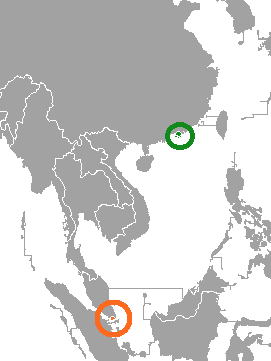
Tsing Yi, sometimes referred to as Tsing Yi Island, is an island in the urban area of Hong Kong, to the northwest of Hong Kong Island and south of Tsuen Wan. With an area of 10.69 km2 (4.13 sq mi), the island has been extended drastically by reclamation along almost all its natural shore and the annexation of Nga Ying Chau (牙鷹洲) and Chau Tsai. Three major bays or harbours, Tsing Yi Lagoon, Mun Tsai Tong and Tsing Yi Bay (青衣灣) in the northeast, have been completely reclaimed for new towns.
Oriental Daily News is a Chinese-language newspaper in Hong Kong. It was established in 1969 by Ma Sik-yu and Ma Sik-chun, and was one of the two newspapers published by the Oriental Press Group Limited. Relative to other Hong Kong newspapers, Oriental Daily News has an older readership.

Kwai Hing is an elevated railway station on the Tsuen Wan line of Hong Kong MTR system. It is named after the nearest public housing estate, and is between Kwai Fong and Tai Wo Hau stations.

Link Real Estate Investment Trust, previously known as The Link Real Estate Investment Trust, is a wholly-owned private real estate investment trust managed by Link Asset Management Limited. It is the first real estate investment trust in Hong Kong and the largest in Asia by market capitalisation.

Jardine's Lookout is a mountain in Wan Chai District, Hong Kong with a height of 433 metres (1,421 ft). It is located east of Happy Valley, south of Causeway Bay, and west of Braemar Hill and north of Tai Tam Country Park.

Lai Chi Kok Road is a road in western Kowloon, Hong Kong. It links Lai Chi Kok to Mong Kok, via Tai Kok Tsui, Sham Shui Po and Cheung Sha Wan. It starts from a junction with Nathan Road near Pioneer Centre in the south and ends near Mei Foo Sun Chuen. The road is bidirectional except the section at Lai Chi Kok, between the junction with Butterfly Valley Road and Mei Foo Sun Chuen, where it serves New Territories-bound traffic only. The Kowloon-bound traffic uses Cheung Sha Wan Road, separated by the flyover of Kwai Chung Road. The road once hosted shipyards, fish, meat and vegetable wholesale markets, which were moved closer to the coast after extensive reclamation.

North Lantau New Town is the newest of the nine new towns in Hong Kong, a special administrative region of China, located on the northern coast of the Lantau Island in the New Territories. It covers Tung Chung, Tai Ho Wan, Siu Ho Wan, other parts of northeast Lantau Island, and the reclaimed land along the coast between them. It is the only new town in the Islands District and the youngest new town in Hong Kong. As the commercial, residential and community facilities in the New Town are concentrated in Tung Chung, it has been renamed Tung Chung New Town in recent official government documents.

Kwai Hing Estate is a public housing estate in Kwai Hing, Kwai Chung, New Territories, Hong Kong. It was built in the valley of Gin Drinkers Bay, later the town centre of Kwai Chung. Kwai Hing station is named after the name of the estate. It comprises 4 buildings with a total of 400 rental units and 1 shopping arcade.

The following is an overview of Public housing estates in Kwai Chung, Hong Kong, including Home Ownership Scheme (HOS), Private Sector Participation Scheme (PSPS), Sandwich Class Housing Scheme (SCHS), Flat-for-Sale Scheme (FFSS), and Tenants Purchase Scheme (TPS) estates.
In January 2012, Peking University professor Kong Qingdong made televised remarks suggesting that many Hongkongers were disloyal to China and still harboured a colonial mentality. Kong Qingdong called Hongkongers "dogs" in response to an online video posted about a mainland Chinese child eating on the subway, which is prohibited by MTR regulations. This prompted a series of campaigns against Kong Qingdong in Hong Kong. About 150 people gathered at the Central Government's Liaison Office on 22 January to protest Kong's remarks.

Mat Yeung Ming is a Hong Kong television actor and host known for his roles as Lui Ting in Screen Play (2000), as Wan Po-yu in The 'W' Files (2003), as Tin Hoi in Be Home for Dinner (2011), and as Senior Inspector Jasper Kong in Master of Play (2012).

Moral and national education (MNE), initially known as Moral and civic education (MCE), was a school curriculum proposed by the Education Bureau of Hong Kong in 2012.

Public factory estates are blocks of factory buildings owned by the Government of Hong Kong. Built between the late 1950s and the early 1980s, most of these industrial buildings have been demolished during the 1990s and 2000s, while some have been converted and a few are still active. While these buildings are notable as witnesses of the history of manufacturing in Hong Kong and of the public housing policy of the Government of Hong Kong, they represent only a fraction of the industrial buildings of the territory: there were about 1,700 industrial buildings in Hong Kong in 2003.

Both Hong Kong and the Republic of Singapore are former British colonies which have maintained trade relations since the 19th century, and have both become important financial centre, maintaining diplomatic missions and trade offices to further their bilateral relations.

Tsui Ka Ho, better known by his pen name Lam Yat-heiy or Roy Tsui, is a Hong Kong lyricist, who has composed over 80 pieces of lyrics since 2007. He is also a writer and the founder of Blackpaper Limited, a local publisher involved in multimedia creation and advertising campaigns. Multiple business and media channels are owned by Tsui under Blackpaper Limited, including Whitepaper Publishing, periodical magazine Blackpaper, satirical weekly magazine 100 Most and multimedia platform TVMost.

TVMost is a Hong Kong online video platform established by Most Kwai Chung, the company which also runs Hong Kong magazine 100Most. It uploads daily sarcastic videos satirizing current events in Hong Kong. Its slogan is "Go all out, even better without a licence".

"Liberate Hong Kong, revolution of our times" is a slogan used by social movements in Hong Kong. The slogan was first used in 2016 by Hong Kong Indigenous spokesman Edward Leung as his campaign theme and slogan for the 2016 New Territories East by-election. He emphasised that anyone could take part in innovation and change regardless of age, hence the use of the phrase "revolution of our times." In the legislative election held later that year, Youngspiration, which was cooperating with Hong Kong Indigenous as Leung was banned from running by the Electoral Affairs Commission, also used the slogan for their campaign.

After the 1 July police stabbing, Hong Kong police and the government characterized the incident as a "lone wolf" terrorist attack. Foreign media saw the stabbing as a sign of a steep decline of the reputation of the police in the eyes of some locals, a process that had begun with the 2019–2020 Hong Kong protests. They also considered the uncovering of a bomb plot on 5 July as evidence of a polarization in society, and pointed to the influence of diminishing legal ways to voice dissent in the year since the national security law came into effect. At the beginning of the month, the police arrested citizens who posted on the Internet for inciting others to kill the police. Later it persecuted members of the student union of Hong Kong University for having passed a motion, subsequently withdrawn, that had praised the "sacrifice" of the deceased attacker of 1 July.















